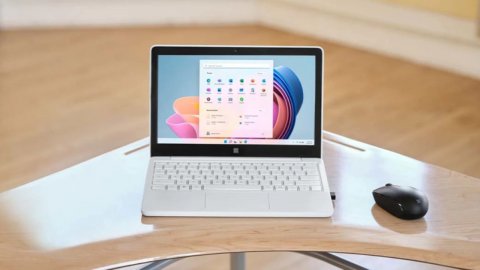
Windows 11
Microsoft has found that some virtualization features of Windows 11 can impact game performance and has therefore decided to provide gamers with instructions to disable them, obviously explaining that you do so at your own risk. However, advanced users may consider turning them off.In an English-language support document published not long ago, Microsoft says that "continuous testing and user feedback" has determined that it is the Memory Integrity that the Virtual Machine Platform (VMP) may impact system performance in games.
"Gamers who want to prioritize performance have the ability to disable these features during gameplay and re-enable them a finished ", reads the support document just published. "However, if disabled, the device may be vulnerable to threats."
Windows 11 Memory Integrity helps ensure that the drivers installed on the operating system are reliable and protects the system from attack, while VMP provides essential services for the virtual machine. Both Memory Integrity and VMP are now pre-enabled on new Windows 11 systems to allow Microsoft to better protect its customers from security threats, but the company wants to allow users who are able to configure their systems to meet their specific needs, even if it means disabling security features.
"The system requirements of Windows 11 remain the same," says Pavan Davuluri, CVP, Windows Silicon & System Integration. "There are no changes and our recommendation remains to keep the functions active for optimal protection."
To disable Memory Integrity, you need to select Start, type 'Core Isolation' in the taskbar and click on the Core Isolation result to open the Windows security application. From this page, you can disable the memory integrity option.
To disable VMP, select Start, type "Windows Features" and select "Enable or Disable Windows Features" from the list of results. A new Windows Features window will open. Look for "Virtual Machine Platform" in the list and deselect it. Microsoft states that you may need to restart your device to enable the changes.
Remember to reactivate everything at the end of the game session and only perform these steps if you are sure you know what you are doing.
Source Did you notice any errors?
A surprising number of PCs can't upgrade to Windows 11. Here's why
Image: Getty/MoMo ProductionsJust over 40% of all enterprise workstations won't make the upgrade to Windows 11 due to Microsoft's minimum hardware requirements, according to new research from IT asset management firm Lansweeper.
Microsoft released Windows 11 in October 2021 and released Windows 11 22H2 on September 20, but many organisations haven't got around to upgrading yet, and hardware that doesn't make the grade is going to be one of the factors holding them back.
The main obstacles to upgrading devices to Windows 11 are the CPU and the Trusted Platform Module (TPM), which was either not present or not enabled in the research. Windows 11 requires TPM 2.0 and approved CPUs. Lansweeper found that 42.76% of CPUs failed to meet the minimum, while 14.66% didn't meet Microsoft's TPM 2.0 requirement.
'Lansweeper data based on an estimated 30 million Windows devices from 60,000 organizations reveals that on average, only 57.26% of the workstations are eligible to receive the automatic upgrade, while the rest would be ineligible,' Lansweeper's Esben Dochy notes in a blogpost.
Also: Windows 11 22H2: How to get Microsoft's latest OS update and what's coming next
The share of enterprise workstations that can update to Windows 11 has improved over the past year, though: last October, Lansweeper found 55% of workstations didn't meet the Windows 11 minimum system requirements.
Dochy notes that the percentage of devices that meet the CPU and TPU requirements have increased by 12%, while those meeting RAM requirements rose by 1.8% (the vast majority of PCs already meet the 4GB RAM minimum).
Last October, Microsoft officials were extremely confident that no customer will be left behind on unsupported Windows 10.
'If this growth continues, theoretically all devices should be Windows 11 compatible by 2026. Although this does fall short of the Windows 10 end-of-life on October 14, 2025,' notes Dochy.
PC shipments are slowing dramatically. IDC reported this week that cooling demand plus supply chain problems caused PC shipments to decline 15% year on year in the third quarter (Q3) of 2022, totaling 74.2 million units. Shipments by Lenovo, HP, Dell and Asus were all down for the quarter between 15% and 28%. Apple bucked the industry trend with a 40% rise in shipments.
Even though more hardware meets Windows 11 requirements, Lansweeper's research found Windows 11 adoption remains limited. It claimed only 2.61% of users across business and consumer have upgraded to Windows 11, while 81.87% remain on Windows 10. It says its data is based on research from over 27 million Windows devices. Windows 11 adoption among consumers was slightly higher at just over 3%, while business adoption was just under 2.5%.
Lansweeper's estimate for Windows 11 adoption is much lower than estimates from Steam, the Valve-owned gaming platform. Steam users likely do invest more in hardware than general consumers. Nonetheless, it reported Windows 11 adoption was at 25% in September 2022, up from 20% in May, while 71% were on Windows 10, and 2.4% were on Windows 7.
GlobalStats puts Windows 11 adoption at 13.6%, behind Windows 10 adoption of 72%. But the US government's website analytics portal hasn't been updated to track Windows 11. Microsoft chief Satya Nadella has said enterprises are adopting Windows 11 'at a faster pace than previous releases.'
Source: Lansweeper